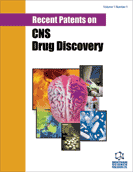Abstract
Since the introduction of levodopa therapy in the 60s, there has yet to be a more efficacious drug identified for the symptomatic treatment of Parkinsons disease (PD). Perhaps more importantly, there has been little to no success finding agents that have proven effective in protecting against neurodegeneration. In fact, recent development efforts have been primarily directed at stabilizing the side effects (wearing off, drug-induced dyskinesias, motor fluctuations) that accompany prolonged levodopa therapy, such as catechol O-methyltransferase inhibiton to combat the side effects of levodopa therapy. This review also examines alternative strategies to levodopa therapy, including potential adjuncts therapies, recent patents and future directions to be evaluated for neuroprotection. While dopamine agonists are inferior to levodopa in controlling motor symptoms, potential benefits and drawbacks with this class of drugs are presented. Potential neuroprotective agents such as monoamine oxidase-B inhibitors are also examined for their therapeutic benefit as well as their potential to slow disease progression. Neuroprotection will continue to be an important area of research in CNS drug development.
Keywords: Parkinson's disease, basal ganglia, dopamine, movement disorder, dopamine agonist, monoamine oxidase inhibitor, treatment, medication
 20
20





















